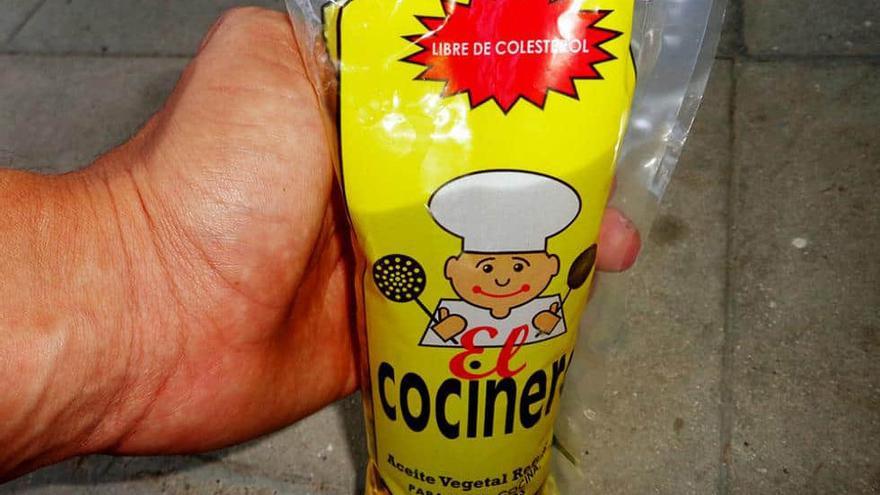
![]() 14ymedio, Havana, 9 June 2021 — With the paralysis of the Santiago de Cuba vegetable oil refining plant, one of the sources supplying the city’s informal market, residents fear that the price of the product will skyrocket even more due to shortages and will end up costing twice as much as they currently pay.
14ymedio, Havana, 9 June 2021 — With the paralysis of the Santiago de Cuba vegetable oil refining plant, one of the sources supplying the city’s informal market, residents fear that the price of the product will skyrocket even more due to shortages and will end up costing twice as much as they currently pay.
“A liter of oil costs 250 pesos and when it disappears, which is almost always, it goes up to 300 (12 dollars at the official exchange rate). Yesterday a friend who lives in Manzanillo called me and told me that she is paying 350 pesos per liter,” Dunia, a resident of Santiago, told 14ymedio.
About 15 days ago, local authorities announced repairs at the Edible Oil Refinery (Erasol) and, this Monday, the director of the company, Ricardo Lores Durán, confirmed to the Granma newspaper that “the available raw material was also exhausted.”
The official explained that the shutdown of the industry will last for several more weeks and that “due to financial restrictions” associated with the “US blockade” the arrival of “crude oil scheduled for March” had been delayed.
However, the vegetable oil crisis in the city has been dragging on since last year. Dunia says that before January, several times he paid 80 pesos for a pound of oil. With the rise in prices associated with the ‘Ordering Task’*, it became not only scarce, but “almost unattainable,” he says. In addition, in the stores that only accept payment in freely convertible currency (MLC) they hardly sell the product and the little that is sold in the network of stores in pesos “already has owners.”
“There are no possibilities for people to buy the little oil the stores put on the shelves because resellers monopolize the line. Here we have to buy everything at a premium. The street sellers don’t give anyone else a chance to buy anything and then they sell things at triple or quadruple their value,” adds the Santiaguan.
With the refinery shut down, the authorities warned that the unrationed sale of the product will be affected and that they will only be able to include oil in the basic market basket sold through the ration stores for the month of July. Santiago’s industry supplies that province and also Las Tunas, Granma and Guantánamo.
Although Durán assured that there is already a ship sailing to the port of Santiago with the raw material, he expects the cycle of regulated distribution to be reestablished next month, but did not refer to whether the sale in the network of state stores will stabilize.
Vegetable oil is widely used in Cuban kitchens, mainly sunflower, soybean and corn, a use that has been expanding as the traditional fat, mainly from pork, disappears from recipes, a sector in decline due to the lack of of animal feed.
Cuban culinary culture also abounds in fried foods and the lack of other products, such as sauces, various condiments or various dressings, force families to use vegetable oil in many dishes, a practice that several studies indicate as harmful to health due to its link to obesity.
However, in Cuba the lack of vegetable oil for cooking is associated in the popular mentality with the crisis, such as the one that the island went through in the 90s. Having to boil food or cook it “without fat” is considered by the vast majority of Cubans as a sign of misery and lack of resources.
In other eastern Cuban cities such as Baracoa, in Guantánamo, a liter of oil is sold on the black market for 200 pesos, and in Holguín, a resident of the Sagua de Tánamo municipality reports it is selling at “300 pesos and continues to rise.”
“There are many things here that have already changed their status. Science fiction literature in Cuba now is no longer about aliens or robot technology that is going to end the universe, here science fiction is oil, chicken, rice; and beans, corn, sweet potatoes enter into ancient and medieval literature, that is, they are only memories,” joked the man from Holguin.
Erasol is the only industry on the island that processes edible oil, while the companies located in Camagüey and Havana are only dedicated to packaging.
In the Cuban capital, at the beginning of last May, several complaints gained force on social networks after some Internet users published images of one-liter bottles of oil, made in Russia, with a label that read that the sale of the product because it belongs to a lot of donations from the United Nations World Food Program (WFP).
The Ministry of Internal Trade then alleged that breakage in the domestic industry had prevented the product from being bottled for sale on the rationed market and that they would replace the WFP bottles as soon as possible.
*Translator’s note: The ‘Ordering Task’ [Tarea ordenamiento] is a collection of measures that includes eliminating the Cuban Convertible Peso (CUC), leaving the Cuban peso as the only national currency, raising prices, raising salaries (but not as much as prices), opening stores that take payment only in hard currency which must be in the form of specially issued pre-paid debit cards, and others.
____________
COLLABORATE WITH OUR WORK: The 14ymedio team is committed to practicing serious journalism that reflects Cuba’s reality in all its depth. Thank you for joining us on this long journey. We invite you to continue supporting us by becoming a member of 14ymedio now. Together we can continue transforming journalism in Cuba.
